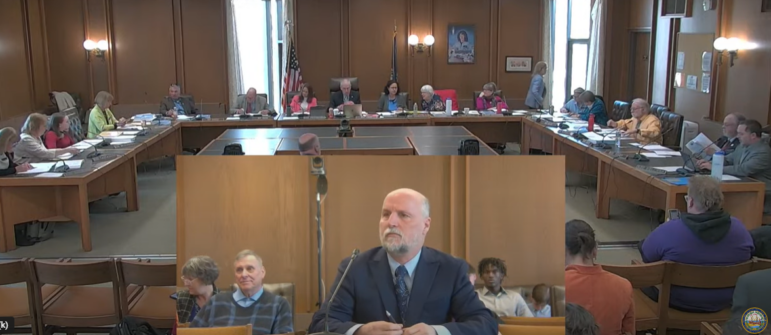By Rep. Marjorie Porter, D-Hillsborough
I celebrated a significant birthday this year so now I can honestly say, “I’m old enough to remember when…” Here goes!
I’m old enough to remember when, back in the 90s, the State of NH turned down grant money from the federal Department of Education, because, as they said, “There is no free money. It always has strings attached.” I remember we were in the midst of an education funding crisis at the time. I remember NH was a solidly red state then too.
I’m old enough to remember when, in the 2011-2012 House session (my first term) the drafters of the draconian O’Brien budget fiddled with the way we taxed hospitals, resulting in the loss of hundreds of millions of federal dollars hospitals used to make up for the uncompensated care they provided. There were massive layoffs, and the hospitals sued the state—and won.
I remember too from those O’Brien days HB 590, “declaring unconstitutional under the federal Constitution the offering of federal grants-in-aid relating to matters not included among the defined powers of the federal government and declaring unconstitutional under the New Hampshire constitution their acceptance in such circumstances, and establishing a committee to review state participation in federal grant-in-aid programs.” (Italics mine.) This passed the House 228-111, because, as Rep Davenport so dramatically put it, the majority at the time thought the federal government was a “monster…who lifts us up and unmoors us” and whose “tentacles…consume us completely.”
Fond memories, those.
I’m old enough to remember the federal funds we sent back—several times—that would help pay for studies on the feasibility of commuter rail, because “federal funds come from taxes too.”
And how could I forget when the Executive Council twice—in 2011 and then again in 2015—denied funding to Planned Parenthood, which left hundreds of low-income women and men without access to cancer screenings and other health services. Now-Governor but then-Councilor Sununu cast one of those no votes.
So that’s why I’m rather surprised to learn Governor Sununu is “disgusted” that the Fiscal Committee turned down the federal grant to increase the number of charter schools in the state. I know he’s a young man, but I would think he too would remember at least some of the times the state has said no to grant money. In the past, it’s Republicans who have put on the brakes. Perhaps he is just surprised it’s Democrats this time?
I don’t sit on the Fiscal Committee, so I could not vote for or against accepting the first $10 million of this $46 million grant. But knowing what I know now, I would have voted against it too. Here are some facts.
There are currently 28 public charter schools in NH. The grant would cover the start-up costs for 27 new charters, effectively doubling the number, and would expand five already in existence.
The charter schools NH has now have seats for around 4,000 students. 1,252 of those seats remain empty.
Charter schools are public schools and receive money from the state education fund. The base adequacy aid the state gives for each public school student is $3,700, but that is not nearly enough to pay for the costs to educate our kids.
Local public schools make up the difference with local property taxes.
Because charters can’t do that, the state chips in another $3,500 per charter student—effectively doubling what it gives to kids attending local schools.
But that is still not enough, so charters must fund-raise to stay viable. And fundraising for the existing schools remains a challenge. Most are on very tight budgets, with the fear of closing very real for many.
The money in this grant is for start-up costs only—not for day-to-day operations. Once the new schools are open, they are on their own for fundraising—just like existing charters. (I suspect the outcome of the vote might have been different if the money went to help fund our existing charters.)
It is estimated doubling the number of charters will cost the state an additional $57-$104 million over the next ten years.
The Commissioner of Education estimates total enrollment in all public schools will decrease by 28% over the next ten years.
When students leave local schools for charter schools, they take their state adequacy money with them. Unfortunately, the schools’ operating costs don’t go down. Heat, transportation, maintenance, salaries all remain the same. Local taxpayers must make up the difference.
The Department of Education did not consult with existing charter schools before applying for this grant.
And finally, according to the Washington Post this month, 35% of charter schools around the country funded by federal Charter School Program grants between 2006 and 2014 either never opened or were shut down, costing taxpayers half a billion dollars. One, right here in the Granite State, never opened, at a cost of $500,000 taxpayer dollars.
Although there is a belief that charter schools have better educational outcomes than regular public schools, national studies have not borne this out. Charters, like local schools, have mixed results—some better, some worse.
If I sat on the Fiscal Committee, I would have had no choice but to vote against accepting this grant. There are just too many unanswered questions.
Do we really need so many new charter schools, with a dwindling school-age population and so many current unfilled slots? What impact will doubling their numbers have on existing charters, and their ability to attract students and fundraise for operating costs? The state is struggling to fund its public schools, and we are awaiting the result of a court case over funding. There is a potential cost to the state of more than $100 million if charters are doubled. Where will that money come from?
I’m old enough to remember just this June, when Governor Sununu vetoed a budget because he said the Democrats’ spending on education included unsustainable future spending.
Now he’s upset because Democrats voted against a grant that will result in unsustainable future spending.
I guess it all depends on who is doing the spending and who’s denying the grants, doesn’t it?





